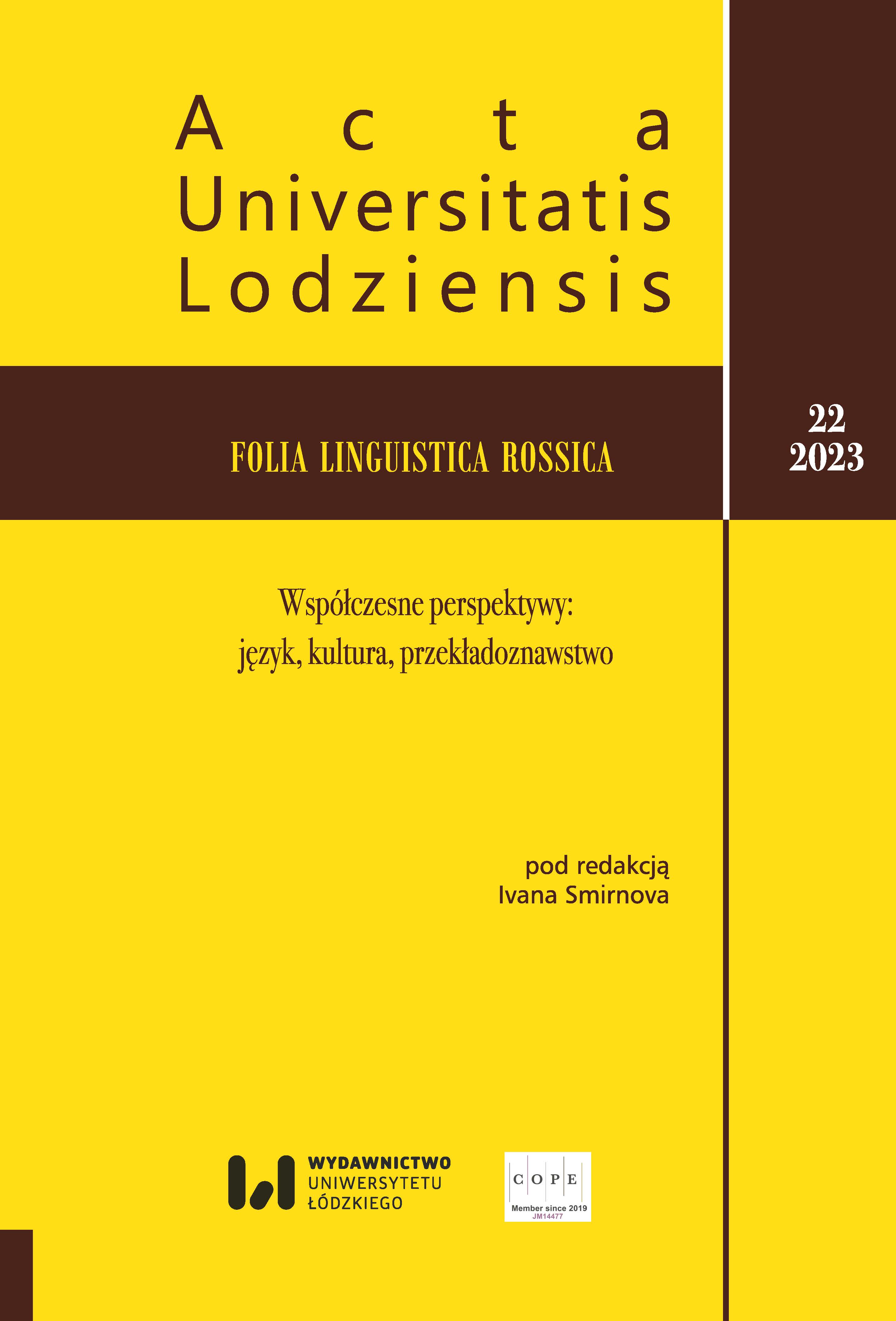Synergetic Analysis of Word-Forming Processes as Reactions to Kazakh Realness
DOI:
https://doi.org/10.18778/1731-8025.22.06Keywords:
synergetics, dissipativity, entropy, chaos and order, bifurcation, fluctuation, word formation, communicative environmentAbstract
The article characterizes language not only as a way of communication, but as a complex and open system that is capable to react to modern reality. Under the external influences, the language system loses its balance. This process becomes more complicated due to the constant flow of information and its exchange with the external environment. The focus is on periods of transition, replacement with a new one, caused by disordering, the formation of a dissipative system, accompanied with entropy, the period of formation of a new one – a bifurcation process, as well as the attraction (attractor) of a dynamic system, which leads to frequent use and the development of word-formation forms. As a result, it contributes to the formation or correction of the norm, other features are acquired, where we observe how new elements take root in the language and in the process of functioning of two languages – Kazakh and Russian. The relevance lies on the analysis of the process of a word-forming phenomenon during the January unrests in 2022, in Kazakhstan shown in mass media.
The whole process is considered from the synergy position. In this case, synergetics makes it possible to see in it approaches for analyzing changes in the language by reaching a point of balance, adaptation and acceptance of language elements.
The purpose of this article is to identify and study the synergistic aspects of the adaptation analyses of word-formation forms in a foreign language environment, where the choice is determined from the varieties of what is currently known. The article reflects the basic concepts of this trend in modern linguistics as well as.
References
Адильхан, Ж., Исабекова, Л. (2020). Почему мнение? Разбираем феномен нурботов в Казахстане, https://school.cabar.asia/ru/articles/fenomen-nurbotov-v-kazahstane/ доступ: 12.03.2023.
Google Scholar
Вежбински, Я. (2017). Динамические процессы в лексическом корпусе современного русского языка. Наука, Мысль: электронный периодический журнал, 67–74.
Google Scholar
Гак, В.Г. (2003). От хаоса к порядку и от порядка к хаосу («Анархия мать порядка, порядок отец анархии»). В: Логический анализ языка. Космос и хаос: концептуальные поля порядка и беспорядка (286–293). Москва: Индрик.
Google Scholar
Герман, И.А. Пищальникова, В.А. (1999). Введение в лингвосинергетику. Барнаул: Издательство Алтайского университета.
Google Scholar
Дрожащих, Н.В. (2012). Введение в динамическую синергетику языка. Тюмень: ТюмГУ.
Google Scholar
Костомаров, В.Г. (1971). Русский язык на газетной полосе: некоторые особенности языка современной газетной публицистики. Москва: МГУ.
Google Scholar
Пиатровский, Р.Г. (2006). Лингвистическая синергетика: исходные положения, первые результаты, перспективы. Санкт-Петербург: Филологический факультет СпбГУ (Серия «Филологические исследования»).
Google Scholar
Шайбакова, Д.Д. (2008). Проблема вариантности языка и синергетическая парадигма. Материалы республиканской научно-практической конференции «Актуальные проблемы преподавания русского языка и литературы в Казахстане», посвященной 90-летию со дня рождения Г.А. Мейрамова (47–51). Караганда: КарГУ имени Е.А. Букетова.
Google Scholar
Adil’khan, Zh., Isabekova, L. (2020). Pochemu mnenie? Razbiraem fenomen nurbotov v Kazakhstane, https://school.cabar.asia/ru/articles/fenomen-nurbotov-v-kazahstane/ accessed: 12.03.2023.
Google Scholar
Drozhashchikh, N.V. (2012). Vvedenie v dinamicheskuyu sinergetiku yazyka. Tyumen: TyumGU.
Google Scholar
Gak, V.G. (2003). Ot khaosa k poryadku i ot poryadka k khaosu («Anarkhiya mat’ poryadka, poryadok otets anarkhii»). V: Logicheskii analiz yazyka. Kosmos i khaos: kontseptual’nye polya poryadka i besporyadka (286–293). Moscow: Indrik.
Google Scholar
German, I.A. Pishchal’nikova, V.A. (1999). Vvedenie v lingvosinergetiku. Barnaul: Izdatel’stvo Altaiskogo universiteta.
Google Scholar
Kostomarov, V.G. (1971). Russkii yazyk na gazetnoi polose: nekotorye osobennosti yazyka sovremennoi gazetnoi publitsistiki. Moscow: MGU.
Google Scholar
Piatrovskii, R.G. (2006). Lingvisticheskaya sinergetika: iskhodnye polozheniya, pervye rezul’taty, perspektivy. St. Petersburg: Filologicheskii fakul’tet SpbGU (Seriya «Filologicheskie issledovaniya»).
Google Scholar
Rigdon, J.C. (2016). Dictionary of Computer and Internet Terms. Cartersville: Eastern Digital Resources. Vol. 1.
Google Scholar
Shaibakova, D.D. (2008). Problema variantnosti yazyka i sinergeticheskaya paradigma. Materialy respublikanskoi nauchno-prakticheskoi konferentsii «Aktual’nye problemy prepodavaniya russkogo yazyka i literatury v Kazakhstane», posvyashchennoi 90-letiyu so dnya rozhdeniya G.A. Meiramova (47–51). Karaganda: KarGU imeni E.A. Buketova.
Google Scholar
Vezhbinski, Ya. (2017). Dinamicheskie protsessy v leksicheskom korpuse sovremennogo russkogo yazyka. Nauka, Mysl’: elektronnyi periodicheskii zhurnal, 67–74.
Google Scholar
Downloads
Published
Versions
- 2024-02-29 (2)
- 2023-12-30 (1)
How to Cite
Issue
Section
License

This work is licensed under a Creative Commons Attribution-NonCommercial-NoDerivatives 4.0 International License.









